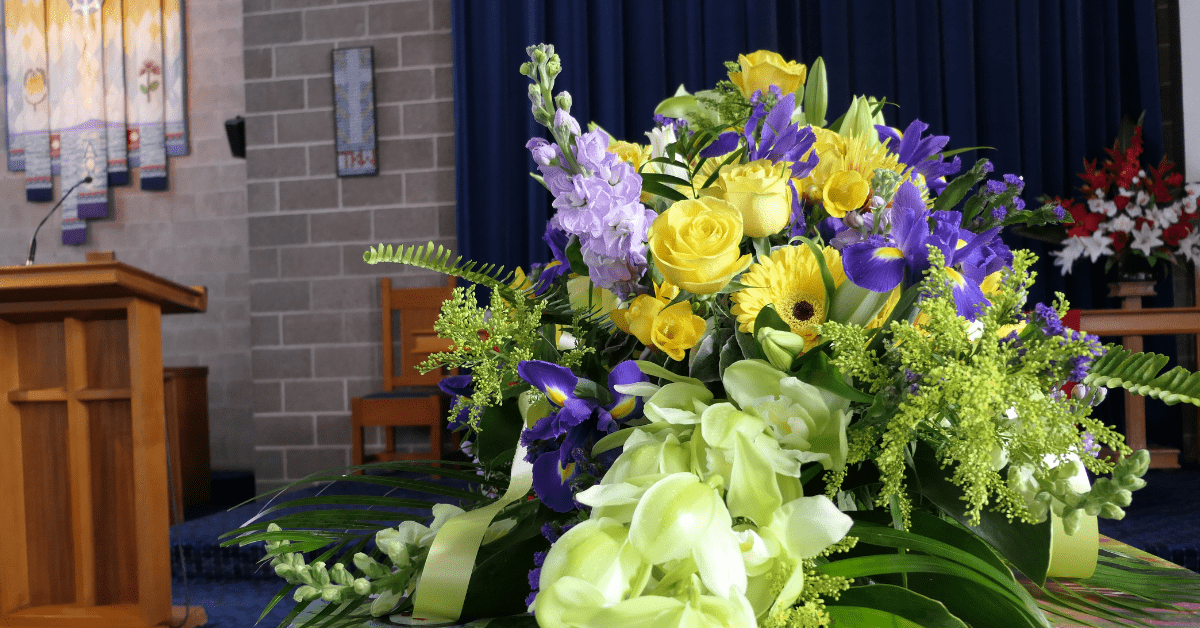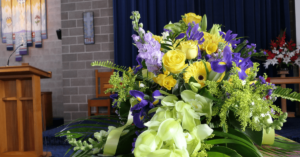Did you know that over 90% of funerals in Britain follow a traditional format, yet many attendees are often unsure about the proper etiquette?
As you prepare to pay your respects, it’s vital to grasp the nuances of British funeral customs, from confirming your attendance to selecting the right attire. Each decision you make should show your respect for the deceased and their family, but steering through these choices can be intimidating.
Let’s investigate the key aspects of British funeral etiquette together, ensuring you can offer your support with confidence and sensitivity, while also respecting the family’s wishes and cultural traditions.
Key Takeaways
- Confirm attendance via phone or email and respect the family’s wishes regarding your presence at the funeral.
- Dress in dark colours unless specified otherwise, and consider the event’s dress code for children as well.
Send flowers through the funeral director or directly to the family, keeping their preferences in mind, and ensure that you’re adhering to the funeral etiquette by letting them guide your choice between flowers and a charity donation. - Offer post-funeral support by sharing memories of the deceased and maintaining communication with the grieving family.
- Dress in dark colours unless specified otherwise, and consider the event’s dress code for children as well.
Confirming Your Attendance
When planning to attend a funeral, it’s important to confirm your attendance by phoning or emailing the family or funeral director. This step, critical in British funeral etiquette, makes sure that the family can accommodate all guests and make necessary arrangements. If you’re unsure about whether your presence would be appropriate, especially in situations where you might be estranged from the family or if it’s a private event, it’s respectful to check with the funeral director who can provide guidance based on the family’s wishes.
If, for any reason, you can’t attend, sending flowers with a heartfelt message to the family is a thoughtful way to express your condolences; utilizing a funeral home’s services for the delivery can ensure your sentiment reaches the family of the deceased appropriately. This gesture isn’t only a part of funeral etiquette in the UK but also helps in letting the family know they’re in your thoughts during their time of grief. Remember, the message to the family should be considerate and reflective of your relationship with the deceased, honouring their memory while offering comfort to the bereaved.
Understanding Procession Participation
After confirming your attendance, it’s important to understand how to participate in the funeral procession. The funeral procession order, typically led by the hearse followed by immediate family members, demands your attention to detail and respect for the grieving family’s wishes. You’ll need to follow the funeral director’s guidance closely. They’re there to make sure everything goes smoothly and to maintain the procession’s solemnity.
Arriving on time is critical. Being late can cause disruptions and is seen as a sign of disrespect. Make sure you’re punctual, allowing yourself extra time for any unforeseen delays, a key piece of advice often found in tips for attending a funeral is to ensure you respect the solemnity of the occasion and the family of the deceased. If you’re part of the procession, this punctuality makes sure you’re in the correct position without causing any hold-ups.
Should I Bring Children
Deciding whether to bring children to a funeral requires careful consideration of their readiness and the event’s importance. When contemplating children’s attendance at funerals, it’s essential to gauge their understanding and comfort with the concept of loss. Funeral etiquette for families suggests allowing children to choose their participation, empowering them to decide based on their feelings and comprehension.
Preparing children for what to expect is vital. Funeral preparation for kids should include a straightforward explanation of the ceremony’s significance and the respectful behaviour expected of them. This preparation can help alleviate any anxiety they may have and ensure they contribute positively to the solemn atmosphere.
Strategically seating families with young children or babies can minimise disruptions, adhering to funeral etiquette for children. It’s also important to make sure that children are dressed appropriately, reflecting the seriousness of the occasion.
Ultimately, including children at funerals can be a valuable experience, teaching them about grief and the importance of support during tough times. However, their attendance should always prioritise the comfort of the child and the bereaved family, maintaining the dignity and respect that the occasion demands.
What To Wear At A Funeral
Choosing the right attire for a British funeral often means opting for dark colours like black, navy, or dark grey to show respect for the deceased and their family. The funeral dress code in the UK underscores the importance of appearing respectful and understated.
What to wear at a funeral for men?
For men, this typically involves wearing a dark suit, a collared shirt, and a black tie, embodying the solemnity of traditional funerals.
What to wear at a funeral for women?
Women are advised to choose dark-colored dresses or suits, paired with smart shoes and minimal accessories, adhering to the principles of funeral etiquette.
British funeral traditions dictate that bright colours and flashy patterns are generally to be avoided unless the family specifies a celebration of life theme where such attire might be encouraged. It’s essential to follow any specific dress code requests made by the family or to consult the funeral director if you’re uncertain about what to wear. This ensures you’re in line with funeral attire expectations and shows your respect for both the family and the occasion.
It's best not to bring flowers to funerals
While considering what to wear is important, it’s also vital to understand that bringing flowers to a British funeral is generally discouraged. This part of funeral etiquette in the UK is often misunderstood by those unfamiliar with the traditions. Instead of arriving with a bouquet in hand, you’re better off sending funeral flowers through the funeral director or directly to the family’s home. This approach respects the family’s wishes and the solemnity of the occasion.
If you’re part of the immediate family or a close friend, you might be aware of the preference for donations to a chosen charity instead of flowers. This shift towards funeral donation amount etiquette in the UK reflects a growing trend of commemorating a loved one’s life in a more meaningful way. It’s always best to follow the family’s lead on this.
Regarding cremation flower etiquette, the same principle applies, with the supplementary advice to consider the family of the deceased’s wishes, which may include preferences for charity donation over flowers. If you’re unsure, it’s perfectly acceptable, and often appreciated, to send flowers after the funeral. This gesture allows you to express your condolences and support without disrupting the funeral service’s decorum. Remember, understanding and adhering to these nuances of British funeral etiquette can significantly support the grieving process.
Instead of flowers give a charitable donation
Flowers are popular at funerals, but sometimes a funeral director will give notice and suggest that instead of giving flowers at a funeral people donate to a particular charity normally close to the deceased instead. This is becoming more common as people think more about sustainability and practicality.
Offering Support After The Funeral
After a funeral, it’s important to show your support and care for the grieving family by sharing fond memories of the deceased and offering your assistance. Following funeral etiquette, you can express sympathy in a way that’s meaningful and helpful. Keep condolence messages simple and heartfelt, steering clear of any inappropriate comments. It’s a gesture that demonstrates your respect and compassion during their time of loss.
Offering assistance goes beyond just saying you’re there for them; it might also mean helping organise details with the funeral home or ensuring guests know when to take their seats at the service. Whether it’s helping with daily chores, running errands, or simply being there to listen, your actions can provide significant comfort. Sending a note to thank the family for organising the funeral service is a thoughtful way to acknowledge their efforts and express your gratitude.
Remembering important dates, such as the funeral anniversary, is crucial. It shows the bereaved that their loved one isn’t forgotten and that they’ve your support, not just immediately after the loss but in the long run. This ongoing expression of sympathy and remembrance can be incredibly comforting to those who are grieving.
Seating Arrangements, Get There Early
Arriving early at a British funeral allows you to find a seat that respects your relationship to the deceased, making sure you’re positioned appropriately during the service. Understanding the seating arrangements is important in adhering to funeral etiquette. At a British funeral, seating is generally unassigned, which means you have the flexibility to choose where to sit. However, it’s significant to recall that the front rows are reserved for immediate family and close friends. By getting there early, you can select a spot that reflects your connection to the deceased without overstepping boundaries.
Arriving ahead of time helps maintain the solemn atmosphere expected at such gatherings. It’s considered courteous to fill in seats from the front, moving towards the back, to avoid isolating the family members during this sensitive time. This approach to seating ensures that the family feels supported and surrounded by those they love and who loved the deceased.
Condolences Expression Advice
Moving from understanding the importance of seating to how we express our condolences, it’s important to approach this aspect with sensitivity and sincerity. In the domain of British funeral etiquette, offering condolences is more than a mere formality; it’s a way of showing your support and sympathy to the grieving family.
When you’re expressing condolences, remember the significance of keeping your message simple and heartfelt. It’s not the time for elaborate speeches or inappropriate jokes about the deceased. Instead, share a fond memory of the person or a sincere message that reflects your support and care. This approach not only honours the deceased but also provides comfort to those left behind.
Offering your sympathy doesn’t end at the funeral. It’s essential to show continued support to the grieving family. This means reaching out, sharing more messages of sympathy, and offering assistance in the days and months following the funeral. Remembering significant dates, like the funeral anniversary, and maintaining communication with the grieving are ways to show that your support is enduring.
Memorial Service Participation
Participating in a memorial service offers you a poignant opportunity to honour the deceased’s life and support their family during this time of grief. Understanding memorial service etiquette is vital to make sure you’re paying respects appropriately, offering condolences, and expressing sympathy in a manner that truly honours the deceased, which often involves knowing what to wear to a funeral and the appropriate time to take your seat.
When you attend a memorial service, you’re not just there as a spectator; you’re an integral part of a communal event that celebrates the life lived. It’s a time to share fond memories, offer support to the grieving family, and come together to remember the individual who’s passed. This shared experience can be incredibly comforting to those who’ve lost a loved one.
Role in Funeral Procession
Understanding your role in a funeral procession is essential for showing respect and following traditions. The funeral procession order is meticulously planned, often placing family members in the first few vehicles to honour their close connection to the deceased. It’s important to arrive on time, as lateness can disrupt the procession’s solemnity and respect. Following the funeral director’s guidance guarantees the procession moves smoothly and with the dignity the occasion demands.
If you’re a family member, expect to be part of the leading group in the procession, a position that underscores your significant loss. For friends and other attendees, your place may be further back, following the immediate family’s cars. This arrangement isn’t just about logistics; it’s a visual representation of the deceased’s circle of life, with those closest to them leading the way.
Whether you’re joining the procession or meeting at the service location, understand that your participation is a gesture of support. By adhering to the funeral procession order, respecting the arrival time, and following the funeral director’s guidance, you contribute to the event’s solemnity and respect, offering a final tribute to the person who’s passed.
Turn Off Your Mobile and Other Devices
Make sure you turn off your mobile phone and other devices to respect the solemnity of a British funeral service. It’s a small but significant gesture that underlines the importance of the occasion and shows your respect for both the deceased and their grieving family. In line with British funeral etiquette, silencing your phone isn’t just about avoiding disruptions; it’s about participating fully in a solemn occasion that deserves your undivided attention.
Handling Grief Afterward
After a funeral, it’s important to seek support and allow yourself time to grieve. The end of funeral ceremonies doesn’t signify an end to mourning; rather, it marks the beginning of a deeply personal journey in understanding the funeral’s meaning and process. Engaging with friends, family, or even a therapist can provide the comfort and guidance needed during this time. It’s also helpful to participate in activities that honour the memory of the deceased, which can range from creating a piece of funeral stationery as a tribute to attending wakes where memories are shared.
Allowing yourself to grieve in your way and timeframe is critical. Remember, there’s no right or wrong way to process your feelings after the funeral process concludes. Whether it’s through quiet reflection or expressing emotions at the wake, what matters is finding a path that resonates with you. Additionally, creating a memorial or dedicating time to write thoughts on funeral stationery can serve as a therapeutic outlet.
Lastly, don’t hesitate to join support groups if you find yourself struggling. Connecting with others who’ve experienced similar losses can offer a sense of community and understanding that’s invaluable during such times.
The Wake is a great place to grieve and share stories
While grieving, you may find comfort in attending the wake, a space where stories and memories of the deceased are openly shared. This gathering, deeply rooted in British traditions, provides a unique opportunity for mourners to come together, offering condolences and support in a more relaxed atmosphere. Unlike the formality of the funeral service, wakes encourage the sharing of stories, allowing attendees to reminisce and celebrate the lives of their loved ones.
Funeral etiquette at wakes often involves listening and speaking with empathy, and understanding that everyone’s grieving process is different. It’s a time when you can offer comfort to the bereaved by sharing fond memories and highlighting the legacy of the deceased. This practice not only aids in the grieving process but also fosters a sense of community among those who were close to the departed.
The Hardest Thing is Knowing What to Say At A Funeral
Delicately handling the delicate task of finding the right words at a funeral often presents a significant challenge. Mastering funeral etiquette involves more than just showing up; it’s about expressing sympathy and offering comfort in a way that’s respectful and meaningful. When you’re at a loss for what to say, bear in mind that simplicity is key. A heartfelt ‘I’m so sorry for your loss’ can mean the world to those mourning. It’s an expression of sympathy that supports the grieving family without overstepping.
Sharing a fond memory of the deceased is another way to show your support while adhering to appropriate behaviour. This not only offers comfort but also celebrates the life of the one who’s passed. However, it’s important to steer clear of making jokes or inappropriate comments during this solemn time. Your presence alone, combined with gentle words, can provide immense comfort to the bereaved.
At its core, funeral etiquette is about being there for the grieving family, providing a shoulder to lean on. Bear in mind, that it’s not about saying the perfect thing but about showing that you care. Your support during their time of loss is what truly matters.
Respecting Privacy and Wishes
In respecting the wishes and privacy of the grieving family, it’s important to refrain from attending the funeral if it’s marked as private or if your presence mightn’t be welcome. Funeral etiquette demands sensitivity towards the family’s feelings and circumstances, which may include coordinating with the funeral car procession or respecting their request for charity donations instead of flowers. Honouring their wishes is a fundamental part of showing your respect during such a difficult time. Should the invitation not be clear, or if you’re unsure about your welcome due to past estrangements, it’s advisable to reach out for attendance guidance. This could involve consulting the funeral director or directly asking a close family member, always making sure you’re not adding to their burden.
If you find yourself unable to attend, perhaps due to the funeral being private or out of respect for the family’s wishes, consider sending flowers with a heartfelt message. This gesture communicates your condolences and support without intruding on their privacy. Remember, respecting privacy extends beyond the day of the funeral. It encompasses all interactions leading up to and following the ceremony. By adhering to these aspects of funeral etiquette, you make sure that your actions contribute positively to the grieving process, honouring the deceased and their loved ones in the manner they’ve requested.
The Weeks After Is Where The Family May Need The Most Support.
After the funeral, families often need the most support, including practical help and emotional care, as they navigate their grief. In the UK, the period following a funeral can be especially important. You can offer significant assistance by tackling some of the administrative tasks that can seem overwhelming. This might include helping with paperwork, making phone calls, or managing financial matters that the grieving family must address.
Offering practical support is also vital. Consider cooking meals, running errands, or assisting with household chores. These acts of kindness can provide comfort and ease the daily burden on the family. Additionally, don’t underestimate the value of emotional support. Regular check-ins, offering a listening ear, and being present can make a significant difference. It’s about being there, whether to talk, share memories, or simply sit in silence.
Helping with arrangements for support groups or therapy sessions can also be beneficial. It shows a deeper level of care and understanding of the grieving process. Remember, the weeks after a funeral in the UK are when your support can have the most impact, helping the family to navigate through their loss with compassion and understanding.
It is Always Better To Ask Than Guess
Exploring the complexities of funeral etiquette in the UK, it’s always better to ask rather than guess to make sure you’re respecting the family’s wishes. Understanding British customs can be challenging, especially when it comes to the sensitive nature of funerals. But remember, clear communication is key. By asking specific questions about attire, behaviour, or participation, you’re showing deep respect for the grieving family’s preferences and traditions.
Avoid making assumptions that could lead to unintentional mistakes. For instance, while black attire is traditionally expected, some families might prefer bright colours to celebrate the life of their loved ones. Equally, understanding whether children are welcome, or if there’s a preference for charitable donations over flowers, can only be clarified through direct communication.
Reaching out to the family or funeral director for guidance not only helps you understand these unfamiliar customs but also demonstrates your consideration and empathy. It’s a simple act that ensures your presence and actions contribute positively to the solemn occasion. So, if in doubt, always opt for asking. It’s the most respectful and appropriate approach to honouring the deceased and their family’s wishes.
Frequently Asked Questions
You’ll want to wear dark colours, arrive on time, and follow the family’s wishes regarding attendance. Always confirm your participation, send flowers if you can’t attend, and respect any specific dress codes requested.
When someone dies in Britain, you’ll traditionally send sympathy cards, wear dark colours to the funeral, and either bring flowers or donate to charity. It’s vital to offer condolences and support to the grieving family.
As an immediate family at a UK funeral, you’ll often travel behind the hearse, have a significant role in the proceedings, and honour the deceased. Seating is prioritised for you, without a strict plan.
As a family member at a funeral, you’ll ride behind the hearse, sit in the front rows, possibly perform rituals, greet attendees, and receive condolences, ensuring you honour and respect the deceased’s memory.








